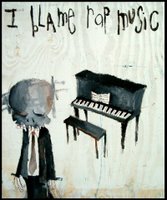Who among us is not a sucker for a good song? Songs are everywhere. Music is, to many generations, portioned out into songs. Songs, songs, songs. In classical music we've got tens of thousands of them by some of the greats. Schubert wrote 500, the largest part of his output. Ives published 114 in a single book, which represents, to my understanding, about half. Poulenc, Auric, Debussy, Faure, Schoenberg, Rorem, Webern, Argento, all composers deeply invested in the song form. So why do these pieces not get the special attention they deserve? It has always baffled me.
Enter the New York Festival of Song where, under the aegis of pianists (slash fonts of knowledge slash bastions of charisma) Michael Barrett and Steven Blier, these small-but-special compositions have been getting their due for years. Live music in a concert hall should always be a special event, and at the concert called
The Banquet Years (named after the impressive and important exegesis of
Belle-epoque Paris by Roger Shattuck) events were on long order. It was nice to see a concert where the music was properly looked after, treated with respect, admiration, and occasionally tough love. Blier, accompanying Mezzo-soprano Marie Lenormand and baritone Hugh Russell through a kaleidoscope of zany adventures, shaped an evening of jewels encrusted into a whole-is-greater-than-the-sum-of-its-parts experience
par excellence, and did it without a dash of pretension or preciousness. Watching Blier play or narrate or kibbitz is watching a man in love with his material--even material he to which he is not overtly well-disposed. (Of a little tune by Auric, he said "...it may not be the best song on the program, but it is the rudest" and took us completely, rudely, there.)
The concert, not-so-neatly divided, was rooted in either pre- or post-Dada. This served as a hotbutton educational tool: we learned about an important epoch--and how the "prettiness" of the Romantic era gave way to the "rudeness" of the 20th century--without a whiff of dusty didacticism. Not an easy stunt for a curator (or in this case, more a wiseacre pianist cum emcee cum educator) or performers to pull off. But they did.
Highlights were Poulenc's Appollinaire collaboration "Le Bestiere" and Ravel's "Trois Poemes de Stephan Mallarme," which can stand alone as a subtle tonality-begat-astringency-begat-atonality lesson, and is sumptuously gorgeous as such. But the evening was not to more common fare alone: Stravinsky's "Pastorale" (a vocalise) as well as generous offerings by Satie, Saint-Saens, and Cabaret songs from the now forgotten Marcel Bloch and Leon Xanrof rounded out this generous, thoughtful, smart concatenation of a program.


